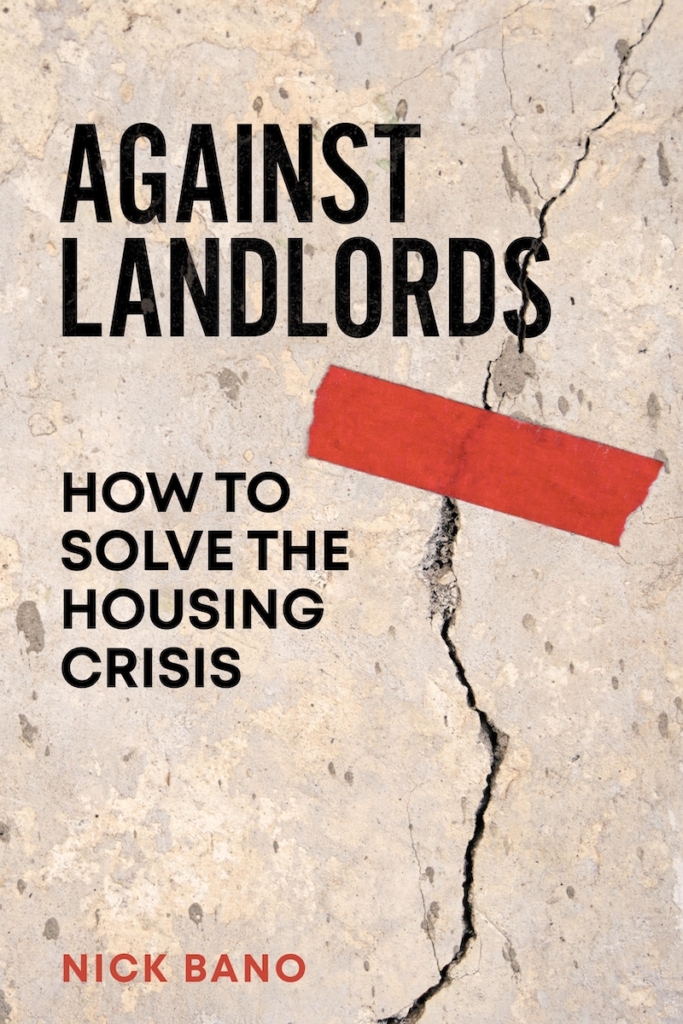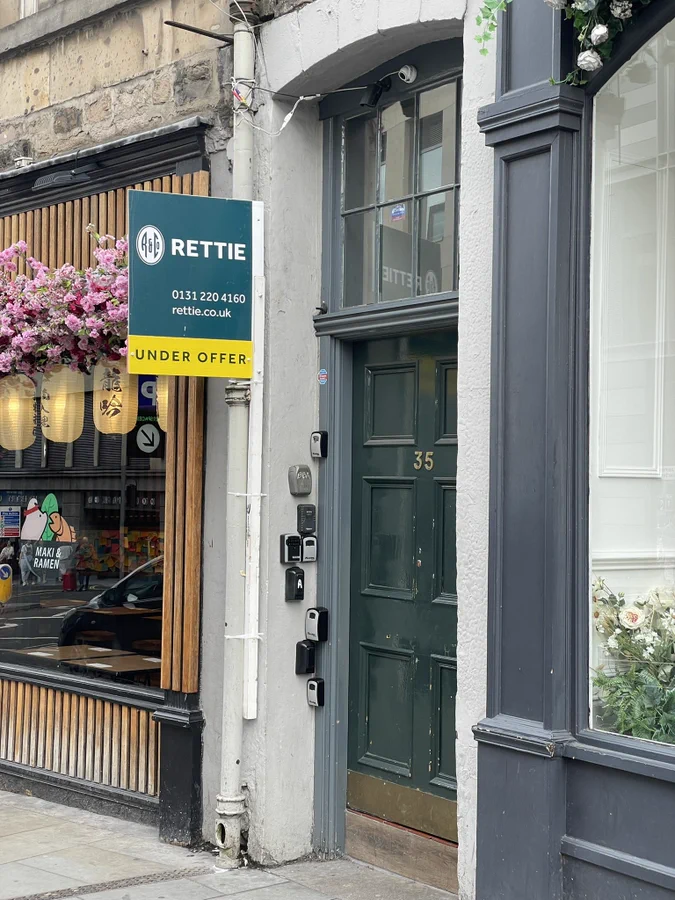Housing, the Rentier Class and the Scottish Media
Like thousands of others I can’t afford to live in the city I grew up in. The housing crisis – in its many dimensions – means social cleansing, in the case of Edinburgh this has an added element of art-washing and a city re-designed almost exclusively for the tourist industry. Huge numbers of people have moved to, or are stuck in the periphery and operate through precarious work and in the gig economy to service the theme park that has transformed much of the social fabric of the city.

‘Housing means prosperity and security for some; poverty, precarity and sickness for others. More people live in private rented accommodation than ever before, and rents rise without apparent reason. Homes are smaller every year, and nearly 20 per cent of tenants live in hazardous conditions. Homelessness is at a new high. Yet the government’s only solution is to promote homeownership.’ So argues Nick Bano in his new book, forthcoming later this month from Verso.
What we are witnessing is the culmination of years of problems exacerbated by the end of council housing, an unregulated and deregulated rental market and the rise of a rentier class with a powerful clandestine political and legal clout.

This crisis goes back decades.
As Shelter write (‘Scotland’s Housing emergency, a timeline‘): “In Scotland, the Right to Buy has resulted in the sale of over half a million council homes in the 30 years from 1980. This has left a massive hole in the available housing stock. Fewer social homes meant longer council waiting lists, and also a reduction in the quality of housing available (since the most desirable homes generally sold first). Spending on new social housing was reduced and benefits to young people were cut.”
Other factors in recent years that have added to the housing problems have been the spectacular growth of Air BnBs and the massive rise in student accommodation as universities race to profit from the lucrative overseas student market.
As we write a massive rental flat and student accommodation development – including a landmark 28-floor apartment building – has been given the go-ahead by Glasgow City Council. Dandara Living has been granted planning permission for nearly 500 one, two and three-bedroom flats for rent and 490 student bedspaces, plus commercial units, at Anderston Quay, beside the Kingston Bridge. Edinburgh is similarly covered in such developments.
Now, at the first real attempt to push-back on the stranglehold of private landlordism – and the response from the sector has been to scream outrage and embark on an often hilarious pr exercise painting themselves as both demonised victims and saviours in this scenario providing a vital social service. The debate has been amplified by an often pliant media which has regurgitated misinformation and distortion from the property sector.

As Ross Greer from the Scottish Green party has written: “There are 238,000 registered landlords in Scotland, and over 340,000 homes for private rent. On 4 March a landlord lobby group – the Scottish Association of Landlords – published a survey of 697 of its members. That’s *0.3%* of all registered landlords.
“Its perhaps not surprising that lobby groups should get so desperate that they resort to speculation over fact. But it’s a sign of how embedded that culture is that such speculation goes unchallenged.”
This is a key battle-ground in Scotland this year. As Living Rent tell us: “We know that unaffordable rents are a major driver of poverty. Housing is the largest financial outgoing in most households, and while low pay is the main cause of escalating poverty rates, our market-driven housing system is the main driver of both poverty and wealth. Scotland’s lowest paid workers are forced to pay a significant proportion of their incomes on rent, with those on the minimum wage paying 50% or more of their take home pay, often on poor quality, badly insulated housing.”
So housing is a matter of health, exploitation and widening social inequality. It is also a matter of mental health, the stress of ‘making the rent on time’ is a hidden social phenomenon. But it’s also a matter of ‘who the city is for’. The banishment of residents to the periphery renders much of the culture of the city inert, what is left is a hollowed-out spectacle, a place where no-one is really from. Whole neighbourhoods literally lose meaning, knowledge of place and become cultural voids. Services such as nurseries and libraries are closed because the makeup of the neighbourhood has utterly changed.
In Edinburgh over-tourism and artwashing go hand in hand to push these changes, in Glasgow gentrification is the main driver. As Neil Gray writes (‘If Beith Street Could Talk: ‘Build to Rent’, Studentification and ‘Purpose Built Residential Accommodation’):
“Gentrification is now a global urban strategy and is much developed from the simple model of almost incidental bohemian gentrification of working-class areas identified in London in the mid-1960s. The Glasgow Harbour and Clyde Waterfront ‘regeneration’ projects are central planks of Glasgow City Council’s boosterist image of the city as a gleaming, spectacle-laden, entrepreneurial ‘destination’ for upmarket tourists, investors, developers and residents. As one recent Council report states: “It [Glasgow Harbour] will provide VIP and concierge shopping services and will work with agencies, airports and airlines to promote Glasgow to the national and international market”.
The development can be seen as part of Glasgow’s long-inchoate Clyde Waterfront regeneration plan, which began in the early 2000s. The rather meagre results of this project so far are an alienating landscape with a few ‘iconic’ postcard-view buildings scattered along an almost boat-free river, where simple riverside walks (shelter and rest-free) are accessible to only the bravest and most able pedestrians.”
If the housing crisis is multi-dimensional, and the Scottish Government are to be applauded for trying to tackle spiralling rents, there is less good news elsewhere. In December the government were slammed for its “appalling” plan to dramatically cut its housing budget next year.
Shona Robison, the Finance Secretary, announced Holyrood’s draft spending plans for 2024/25 and claimed it would protect public services. But official documents published shortly after the SNP minister’s speech revealed that spending on housing will fall by more than £200m for the next financial year.
The total amount spent will go down from £738.3m in 2023-24 to £533.2m in 2024-25. The biggest cut will be felt in housebuilding, with a drop of nearly £190m in funding. Aditi Jehangir, from Living Rent, said: “The Scottish Government’s decision to cut 200 million from the housing budget is appalling.”
“One after another, councils are declaring housing emergencies because they simply cannot fulfil their statutory duties to house homeless people.”
“Rents are at record level as the regulations are still too easy on landlords. Tenants’ physical and mental health is worsening because of their housing situation. The government is totally out of touch with the reality on the street and faces a sharp and dire reckoning.”
“They need to commit more funding to deliver more social and council homes and clamp down on rising rents. In the meantime, we’ll be paying the price of their utterly baffling decisions.”
This housing crisis, and the media failure in reporting it will be one of the major themes for Bella Caledonia over the coming year, as these issues come to a head and the need for rent controls are realised as only one dimension of the problems of housing and homelessness.

Govt should impose a 50% rent reduction across the board.
That would be a massive boost to the economy.
Or return to treating rent as unearned income and tax it at 80%.
And a punitive tax on empty property.
Hector – I strongly disagree
A/ which government? Scotland or Westminster? & Who pays the 50%
Ohh of course the taxpayers. We are already paying for the masses on housing benefit.
B/ Landlords already pay tax on profits on rental income.
Punitive & I’ll informed Scottish Government measures have chashed away private landlords.
C/ empty housing stock is an issue, but there is often a story behind each of these properties.
“The masses” strange usage. Rent control isn’t unusual, there were rent controls for many years until the 1970s. They were abandoned because the free marketeers wanted it. The private rented sector is heavily skewed in favour of the landlord. It’s even more so in England.
There may be a story behind empty properties but that is not an excuse to do nothing about the ‘issue’. Without that, the best response is squatting, but that is illegal in Scotland and there are no squatters rights. It used not to be in England but now is (though the law is a bit confused as there is still such a thing as squatter’s rights in England so if nothing is done about you squatting by the owner, after 10 years permanent residence you become the owner), with the exception of non-residential properties.
With discussion of direct action and the like, I would encourage a mass squatting movement of empty properties in places like Edinburgh and Glasgow. I lived in Bristol many years ago and there was a grass roots movement that did this and with some effect on the local council who were sometimes shamed into doing something about empty properties due to the clever campaign by squatters.
One set of citizens profiting from other, poorer citizens’ fundamental need for shelter is never going to produce a healthy society. Any government not providing affordable, decent, dry and warm housing to all those that need it, is not doing it’s job properly.
The hubris that Alec Salmond showed in deciding to call the Scottish devolved administration the Scottish Government has meant that our inability to operate like a sovereign government and to run a deficit has meant that what should be laid at Westminster’s door is blamed on Holyrood. An independent government could decide to end the housing crisis by simply building more houses. Housing in other countries is not seen as a means to increase private wealth but as a necessity for the whole population.
I’m on the board of a housing association. A large part of the problem is that the Scottish government has no serious commitment to build homes, other than newspaper headlines. Firstly housing grant levels force associations to borrow the difference from banks. This works through into rent levels. Secondly, the parliament is full of comfortable home owners, who have no financial problems. They have, in effect a slow, rolling lottery win for life and have no appreciation of the difficulties that poor people face. They are uninterested in the lives of constituents, other than as photo opportunities.
Parliament is full of landlords who should not be allowed to vote on housing issues.
The reply isn’t working.
The article quotes Shelter as blaming the right to buy for a ‘massive hole in the available housing stock’. This is misleading. Few council houses bought by the sitting tenant will have been demolished. This is in contrast to thousands of council houses where the tenants chose not to exercise the option to buy. The real scandal is the number of council houses demolished because they were unwanted – even at a time of housing shortages.
In Glasgow these include houses built in the late ’30s – whole schemes such as Blackhill, Moorepark and Barrowfield; those built in the 1950s – a huge part of Drumchapel and high rise flats built in the ’60s – e.g. the Red Road Flats and those in Wyndford.
In the post war period, nearly all housing built was council housing. This building boom coincided with a drop in the city’s population from well over a million to around 600,000.
The biggest group exiting the city was those who moved to owner-occupier housing, typically built by John Lawrence or Wimpey, to the north and south of the city.
The massive increase in student flats is extremely unwelcome but is best understood as a response to cities becoming dependent on students for their continued prosperity. This may well prove very short-sighted. Foreign countries may soon decide that they can do without Scottish
universities as they decided – a few decades back -that they could do without our coal, our ships and our railway engines.
The point is not that council houses were demolished but they entered the private market and the income from their sale was not plowed back into renewing council housing stock. This was a deliberate attempt by Thatcher to create a ‘property owning democracy’.
If you ignore the fact that thousands of empty council houses were demolished, you fail to understand why council housing (or if you prefer, social housing) ceased to be a policy round which the Left could mobilize.
Building new council houses, when large numbers of existing council houses were empty and awaiting the wrecker’s ball, was never going to be realistic. ‘Renovating’ existing ones which could not be sold even at a massive discount, would have been throwing good money after bad.
I’m confused as to your first sentence. It doesn’t make sense. The disappearance of “the left” has nothing to do with the demolition of unlettable housing. As the left saw the neoliberals take over the Labour Party, we left. Allied to this is the disengagement of young people from politics. Up until the mid 80s Labour young socialists were on what was called the hard left. The Blairites excluded them and they disappeared as a political movement. So the Scottish left, getting old and not being renewed either gave up, went to fringe parties or the SNP. Now both parties are controlled by careerists enjoying the holyrood gravy train. It’s an almost totally middle class institution., with a disproportionate number of (Glasgow) university graduates.
It wasnt to create a property owning democracy at all , it was to remove council housing and reinstate the private landlord monopoly.
Yes but the political mission of Thatcher was to create a ‘property owing democracy’ because they knew that people who had bought their own homes were more likely to vote Tory
Yes
Interestingly, it worked in England but not here in Scotland. There’s a phd waiting to be written on why.
Agreed